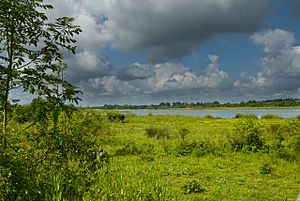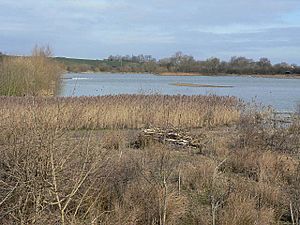Summer Leys facts for kids
Quick facts for kids Summer Leys |
|
|---|---|
 |
|
| Type | Local nature reserve |
| Location | Wollaston, Northamptonshire |
| Nearest city | Wellingborough |
| Area | 50 hectares (120 acres) |
| Operated by | Wildlife Trust for Bedfordshire, Cambridgeshire and Northamptonshire |
| Status |
|
Summer Leys is a special place in Northamptonshire, England, where nature is protected. It's called a local nature reserve. You can find it near Wollaston, in the beautiful Upper Nene Valley. The Wildlife Trust for Bedfordshire, Cambridgeshire and Northamptonshire takes care of this amazing area.
Contents
What is Summer Leys Like?
Summer Leys was once a place where gravel was dug from the ground. Now, it's a thriving nature reserve. It covers almost 50 hectares (120 acres), which is about the size of 70 football fields!
Most of the reserve is a wetland, which means it has lots of water. There are also areas of grassland and woodland with hedges. To keep the grassland healthy, special cattle and rare-breed sheep graze there.
On the north side of the reserve, you can still see where an old railway line used to be. This railway, called the Northampton and Peterborough Railway, closed in 1972.
If you visit, you'll find four special bird hides. These are small buildings where you can watch birds without disturbing them. One hide even looks out over a feeding station for birds. There's also a car park on Hardwater Road for visitors.
Why is Summer Leys Important?
Summer Leys and the nearby gravel pits are very important for wildlife. They are part of a bigger area called the Upper Nene Valley Gravel Pits. This whole area has special protections because of the many birds that live there.
It is known as a Site of Special Scientific Interest (SSSI). This means it's a top spot for wildlife and geology in the UK. It's also a Special Protection Area (SPA), which protects wild birds. On top of that, it's a Ramsar wetland of international importance. This global title means it's a super important wetland for birds, especially those that spend the winter there.
A Look Back: Summer Leys' History
Before the 1980s, the land that is now Summer Leys was used for farming. It was divided into two fields.
Then, a company called Hanson Aggregates started to quarry for gravel here. After they finished digging out the gravel, the land was reshaped. This reshaping helped turn the old quarry into the beautiful nature reserve we see today.
Amazing Animals at Summer Leys
Summer Leys is home to many different animals, especially birds and insects.
Birds
Many types of wading birds come to Summer Leys to breed. These include:
- Oystercatchers
- Redshanks
- Ringed plovers
- Little ringed plovers
In winter, you can see huge groups of golden plovers here. Lots of ducks also spend their winters at the reserve. These include:
Other Wildlife
Keep an eye out for otters! These playful animals are often seen at Summer Leys.
The reserve is also a great place for rare insects. Some special insects found here are:
- The hairy dragonfly
- The brown argus butterfly
- A rare water beetle called Hydaticus transversalis, which was first found here in 2008.
 | Misty Copeland |
 | Raven Wilkinson |
 | Debra Austin |
 | Aesha Ash |


